5G Technology Training Courses
-

Wray Castle Hub Subscription
Annual Telecoms Training Subscription Package with Unlimited access to 500+ hours of key training material Empower your professional development by building your knowledge of key technology and business topics within the telecoms industry. Unlimited access to future new courses that will cover the latest technology developments as they are added to Hub throughout your 12-month subscription period. Endlessly flexible and applicable to any role within the telecoms industry a subscription to Wray Castle Hub is your ultimate learning resource. You can choose to follow one of our suggested learning pathways, build your own or dip into the learning material module by module.
£1,400.00
-
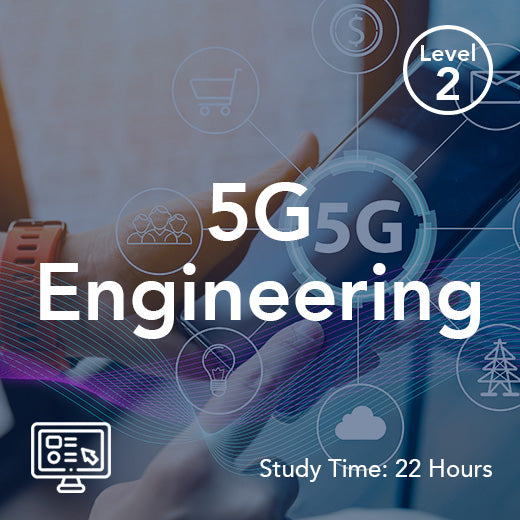
5G Engineering (On-Demand)
This 5G Engineering on-demand course is a technical introduction to 5G. The course includes the design goals and development schedule for 5G, the principles, design and implementation of the 5G air interface, radio access network and core network, and the operation of the 5G system. This course is delivered as a self-paced on-demand distance learning course and features illustrated course books, videos, tests and full tutor support. Who would benefit This course is intended for engineers either new to, or already working in, mobile communications. Prerequisites Familiarity with telecommunications and general engineering terminology is assumed. Some understanding of LTE cellular systems would be beneficial. Topic Areas Include 5G introduction, key features and standardisation Use cases and performance objectives Principles of the air interface: radio spectrum, OFDMA and multiple antennas Air interface protocol stack Architecture of the air interface physical layer Procedures for data transmission and reception on the 5G air interface Radio access network architecture and protocols Non-standalone and standalone deployment options Core network architecture and protocols Network function virtualisation and network slicing Interworking and compatibility between 5G, LTE and Wi-Fi PDU connectivity, Quality of Service and service provision Signalling procedures in the 5G network
£1,815.00
-
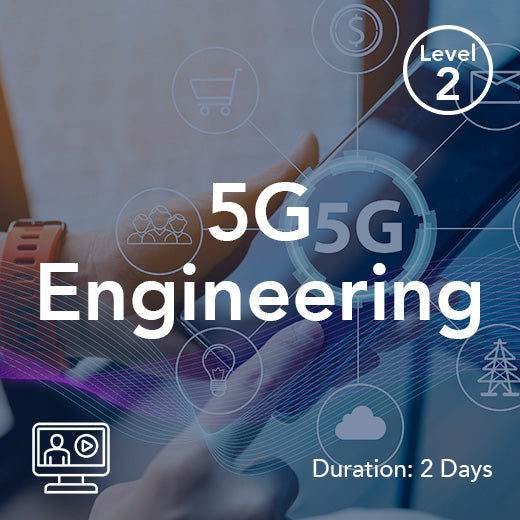
5G Engineering
This 5G Engineering course is a technical introduction to 5G. The course includes the design goals and development schedule for 5G, the principles, design and implementation of the 5G air interface, radio access network and core network, and the operation of the 5G system. Who would benefit This course is intended for engineers either new to, or already working in, mobile communications. Prerequisites Familiarity with telecommunications and general engineering terminology is assumed. Some understanding of LTE cellular systems would be beneficial. Topic Areas Include 5G introduction, key features and standardisation Use cases and performance objectives Principles of the air interface: radio spectrum, OFDMA and multiple antennas Air interface protocol stack Architecture of the air interface physical layer Procedures for data transmission and reception on the 5G air interface Radio access network architecture and protocols Non-standalone and standalone deployment options Core network architecture and protocols Network function virtualisation and network slicing Interworking and compatibility between 5G, LTE and Wi-Fi PDU connectivity, Quality of Service and service provision Signalling procedures in the 5G network
£1,815.00
-
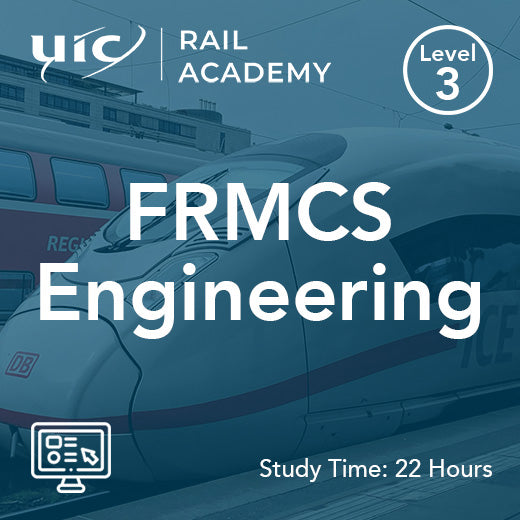
FRMCS Engineering (On-Demand)
GSM-R end of life is anticipated to be around 2030 which only leaves a few years to find a replacement system. The International Union of Railways (UIC) have published a document called FRMCS- Future Railway Mobile Communications System which outlines what will be required of a future system. The railway community have detailed the communications requirements of the future railway networks and are looking for telecommunications manufacturers and standards bodies to provide a suitable solution. This technical course is aimed at engineers planning to deploy FRMCS as a successor to GSM-R. It identifies the specifications for FRMCS, the design aims, architecture of the On-Board systems, trackside systems and the transport network. Additionally, the course details the capabilities of FRMCS, operational procedures and looks at possible migration scenarios with GSM-R. Now fully updated to include FRMCS V2 specifications. Prerequisites Attendees ideally will have a background in telecommunications gained from working in the railway industry and have technical knowledge of GSM-R. Who would benefit? The course is open to anyone that would like to gain an insight into how mobile telecommunications for railways may migrate from GSM-R to the system known as FRMCS. This self-paced on-demand distance learning course features illustrated course books, videos, tests and full tutor support. Topic Areas Include FRMCS – An Introduction FRMCS Reference Architecture FRMCS On-Board Architecture FRMCS Trackside Components Voice Application Subsystem FRMCS Location and Positioning System 5G FRMCS Addressing The SIP Core Mission Critical Architecture and Procedures FRMCS Operation Radio Planning and Migration MCVideo Certified by Institution of Railway Signal Engineers (IRSE) The Institution of Railway Signal Engineers (IRSE) certifies that the syllabus for the FRMCS Engineering course is appropriate for meeting the stated objectives of that course. For more information about the scope of the certification process provided by the IRSE please see the IRSE website www.irse.org.
£2,275.00
-
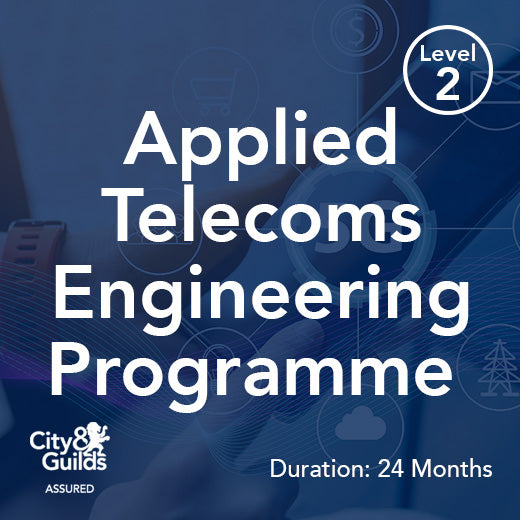
Applied Telecoms Engineering Programme (Cellular Radio Engineer)
The Applied Telecoms Engineering Programme (Cellular Radio Engineer Track) distance learning programme provides learners with a qualification that demonstrates their knowledge of the technologies underpinning the telecoms industry with a focus on cellular radio engineering. Students will gain a through foundation in the telecoms industry and the technologies on which it’s based as well as a comprehensive understanding of the technologies underpinning radio access networks and techniques needed to design, plan, build, monitor and optimise modern cellular radio networks. This programme has been assured by City & Guilds. Assured status provides validation and recognition for the learner. It is a symbol of learning excellence and quality and is a reassurance that the training undertaken meets best practice standards. Applied Telecoms Engineering Programme (Cellular Radio Engineer Track) Syllabus Foundation Courses Technology Fundamentals Course Modules: Defining Telecoms Background to the Telecom Network Digital Fixed Telecom Networks Data Networks Mobile Networks and Wi-Fi Broadband and Emerging Networks 2G to 5G Mobile Technologies Course Modules: Principles of Mobile Cellular Networks 2nd Generation Mobile Networks 3rd Generation Mobile Networks 4th Generation Mobile Networks 5th Generation Mobile Networks Telecoms – as an Industry and Business Course Modules: Telecoms Industry & Business Dynamics The Technology Explained & Evaluated Telecoms Industry & Market Update Specialist Courses LTE Air Interface Course Modules: LTE Overview OFDM Principles Physical Layer Structure Layer 2 Protocols Radio Resource Control LTE-Advanced Lower Layer Procedures 5G Air Interface Course Modules: Principles of the 5G New Radio Introduction to the Physical Layer Physical Layer Implementation and Procedures Higher Layer Protocols Signalling Procedures What you will learn: At the end of the programme successful students will be able to: Develop a fundamental understanding of the technologies underpinning modern telecoms networks, the industry structure and its key stakeholders . Gain a detailed understanding of the air interface for LTE radio access (incl. OFDMA principles, channel structures, connectivity and mobility management and radio link control functions.) Have a detailed technical understanding of the air interface for the 5G New Radio, the principles of mm wave and multiple antenna communications, the architecture of the AI’s physical layer, the higher layer air interface protocols, and the signalling procedures. Expand their learning further by studying two elective modules to qualify for the Diploma in Telecoms. What sets the programme apart? Focused Learning Pathways – guide you through the material and enable you to become an expert in your chosen field. Flexible Learning – study at a time, location and pace of your choice. Full Tutor support – from industry experts with decades of experience throughout your studies. Extended Learning – Diploma students have the opportunity to study 3 additional courses. 24 months access – allowing you to refer back to the material after your studies. Digital Badges and Course Certificate – demonstrate the depth of your knowledge. About City & Guilds City & Guilds is a household brand and a global leader in skills development. Over one million people earn a City & Guilds qualification every year, providing them with the skills they need to thrive in the workplace.In the global economy, the ability to compete depends on building a skilled, competent and confident workforce. City & Guilds understands the value of portable skills and globally recognised standards that enable people and organisations to succeed. It partners with Governments, employers and educators in over 50 countries, across five continents, to advise them on developing high-quality skills training that meets the needs of the global workforce, without compromising on local demands. Enrolment Fees: £2,995 (+VAT) Programme Duration: 24 months (Programme is On-Demand, learners can start at any time) Bespoke In-Company Schemes The Applied Telecoms Engineering Programme provide the ideal structure for formalising training programmes for teams across your business. Contact us on info@wraycastle.com for more information.
£2,995.00
-
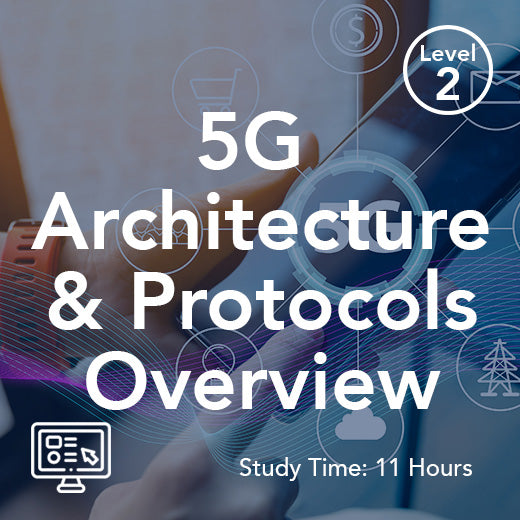
5G Architecture and Protocols Overview (On-Demand)
This 5G Architecture and Protocols Overview on-demand training course is a technical introduction to the 5G network. The course includes the design goals and development schedule for 5G, the principles, design and implementation of the core and radio access networks of 5G. This self-paced on-demand distance learning course features illustrated course books, videos, tests and full tutor support. Who would benefit This course is intended for engineers either new to, or already working in, mobile communication networks. Prerequisites Familiarity with telecommunications and general engineering terminology is assumed. Some understanding of LTE cellular systems would be beneficial. Topic Areas Include: 5G introduction, key features and standardisation Use cases and performance objectives Radio access network architecture and protocols Non standalone and standalone deployment options Core network architecture and protocols Network function virtualisation and network slicing Interworking and compatibility between 5G, LTE and Wi-Fi PDU connectivity, Quality of Service and service provision Signalling procedures in the 5G network
£500.00
-
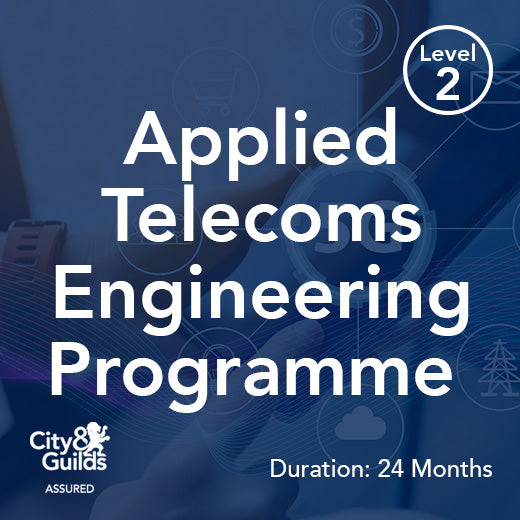
Applied Telecoms Engineering Programme (5G Engineer Track)
The Applied Telecoms Engineering Programme (5G Engineer Track)distance learning programmes provides learners with a certified qualification that demonstrates their knowledge of the technologies underpinning the telecoms industry with a focus on 5G network architecture and protocols and the 5G Air Interface. This programme has been assured by City & Guilds. Assured status provides validation and recognition for the learner. It is a symbol of learning excellence and quality and is a reassurance that the training undertaken meets best practice standards. Applied Telecoms Engineering Programme (5G Engineer Track) Syllabus Foundation Courses Technology Fundamentals Course Modules: Defining Telecoms Background to the Telecom Network Digital Fixed Telecom Networks Data Networks Mobile Networks and Wi-Fi Broadband and Emerging Networks 2G to 5G Mobile Technologies Course Modules: Principles of Mobile Cellular Networks 2nd Generation Mobile Networks 3rd Generation Mobile Networks 4th Generation Mobile Networks 5th Generation Mobile Networks Telecoms – as an Industry and Business Course Modules: Telecoms Industry & Business Dynamics The Technology Explained & Evaluated Telecoms Industry & Market Update Specialist Courses 5G Architecture and Protocols Course Modules: Introduction to 5G Radio Access Network Architecture Core Network Architecture Data Transport 5G Protocols 5G Procedures Releases 16 and 17 5G Air Interface Course Modules: Principles of the 5G New Radio Introduction to the Physical Layer Physical Layer Implementation and Procedures Higher Layer ProtocolsSignalling Procedures What you will learn: At the end of the programme successful students will be able to: Develop a fundamental understanding of the technologies underpinning modern telecoms networks, the industry structure and its key stakeholders . Understand the architecture and interfaces used by 5G, the protocols used for signalling and data transport, the provision of services over a 5G network, and the procedures for signalling and system operation. Master the principles of mmWave and multiple antenna communications, the architecture and implementation of the AI's physical layer, the higher layer AI protocols. What sets the programme apart? Focused Learning Pathways – guide you through the material and enable you to become an expert in your chosen field. Flexible Learning – study at a time, location and pace of your choice. Full Tutor support – from industry experts with decades of experience throughout your studies. Extended Learning – Diploma students have the opportunity to study 3 additional courses. 24 months access – allowing you to refer back to the material after your studies. Digital Badges and Course Certificate – demonstrate the depth of your knowledge. About City & Guilds City & Guilds is a household brand and a global leader in skills development. Over one million people earn a City & Guilds qualification every year, providing them with the skills they need to thrive in the workplace.In the global economy, the ability to compete depends on building a skilled, competent and confident workforce. City & Guilds understands the value of portable skills and globally recognised standards that enable people and organisations to succeed. It partners with Governments, employers and educators in over 50 countries, across five continents, to advise them on developing high-quality skills training that meets the needs of the global workforce, without compromising on local demands. Enrolment Fees: £2,995 (+VAT) Programme Duration: 24 months (Programme is On-Demand, learners can start at any time) Bespoke In-Company Schemes The Applied Telecoms Engineering Programme provide the ideal structure for formalising training programmes for teams across your business. Contact us on info@wraycastle.com for more information.
£2,995.00
-
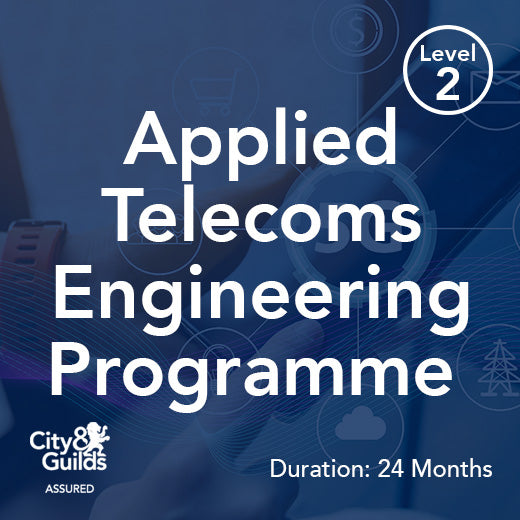
Applied Telecoms Engineering Programme (Core Network Engineer)
The Applied Telecoms Engineering Programme (Core Network Engineer Track) distance learning programmes provides learners with a certified qualification that demonstrates their knowledge of the technologies underpinning the telecoms industry with a focus on core network engineering. Students will gain a through foundation in the telecoms industry and the technologies on which it’s based as well as a deep understanding of the core network procedures, processes and service provision concepts for 4G and 5G Networks. This programme has been assured by City & Guilds. Assured status provides validation and recognition for the learner. It is a symbol of learning excellence and quality and is a reassurance that the training undertaken meets best practice standards. Applied Telecoms Engineering Programme (Core Network Engineer Track) Syllabus Foundation Courses Technology Fundamentals Course Modules: Defining Telecoms Background to the Telecom Network Digital Fixed Telecom Networks Data Networks Mobile Networks and Wi-Fi Broadband and Emerging Networks 2G to 5G Mobile Technologies Course Modules: Principles of Mobile Cellular Networks 2nd Generation Mobile Networks 3rd Generation Mobile Networks 4th Generation Mobile Networks 5th Generation Mobile Networks Telecoms – as an Industry and Business Course Modules: Telecoms Industry & Business Dynamics The Technology Explained & Evaluated Telecoms Industry & Market Update Specialist Courses LTE Evolved Packet Core Course Modules: LTE Overview Evolved Packet Core Data Transport in the EPC Major Protocols EPC Operation Release 9 and Beyond 5G Architecture and Protocols Course Modules: Introduction to 5G Radio Access Network Architecture Core Network Architecture Data Transport 5G Protocols 5G Procedures Releases 16 and 17 What you will learn: At the end of the programme successful students will be able to: Develop a fundamental understanding of the technologies underpinning modern telecoms networks, the industry structure and its key stakeholders . Describe the Evolved Packet Core for LTE systems, architecture, interfaces, service provision concepts, application of IP technologies and the overall protocol architectures. Understand the architecture and interfaces used by 5G, the protocols used for signalling and data transport, the provision of services over a 5G network, and the procedures for signalling and system operation. Expand their learning further by studying two elective modules to qualify for the Diploma in Telecoms. What sets the programme apart? Focused Learning Pathways – guide you through the material and enable you to become an expert in your chosen field. Flexible Learning – study at a time, location and pace of your choice. Full Tutor support – from industry experts with decades of experience throughout your studies. Extended Learning – Diploma students have the opportunity to study 3 additional courses. 24 months access – allowing you to refer back to the material after your studies. Digital Badges and Course Certificate – demonstrate the depth of your knowledge. About City & Guilds City & Guilds is a household brand and a global leader in skills development. Over one million people earn a City & Guilds qualification every year, providing them with the skills they need to thrive in the workplace.In the global economy, the ability to compete depends on building a skilled, competent and confident workforce. City & Guilds understands the value of portable skills and globally recognised standards that enable people and organisations to succeed. It partners with Governments, employers and educators in over 50 countries, across five continents, to advise them on developing high-quality skills training that meets the needs of the global workforce, without compromising on local demands. Enrolment Fees: £2,995 (+VAT) Programme Duration: 24 months (Programme is On-Demand, learners can start at any time) Bespoke In-Company Schemes The Applied Telecoms Engineering Programme provide the ideal structure for formalising training programmes for teams across your business. Contact us on info@wraycastle.com for more information.
£2,995.00
-
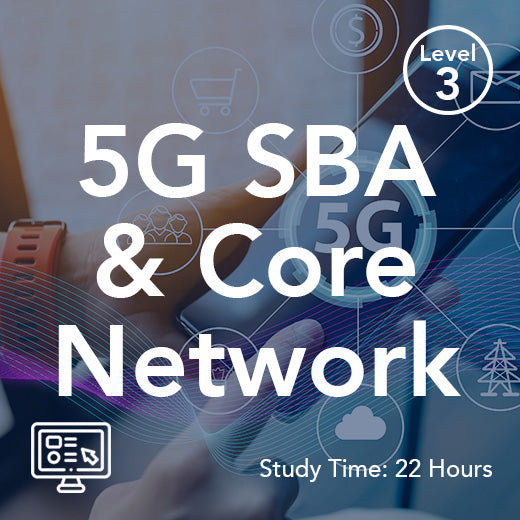
5G Service Based Architecture and Core Network (On-Demand)
Core Network Functions are explored, including their overall purpose, their specific role within the SBA, and the features / services that they support. This is followed by a comprehensive survey of the 5G Core and SBA supporting protocols and technologies, as well as a thorough examination of the Service Based Interface (SBI) and Service APIs (Application Programming Interfaces). Example procedures then allow us to build a comprehensive picture of the relevant techniques and features, and to make sense of the way in which the SBA is consistent with, and supports, key 5G enabling principles - including virtualisation and network slicing. Finally, security on the SBI is explored, highlighting the new network functions and techniques that have been introduced with 5G to provide new security features (including the roaming scenario), and a more secure core network domain. This self-paced on-demand distance learning course features illustrated course books, videos, tests and full tutor support. Who would benefit This course is designed for those involved in the design, deployment and development of the 5G Service Based Architecture and the 5G Core. Prerequisites This is a technical course, so experience or knowledge of the 5G system from a technical perspective would be an advantage. Topic Areas Include 5G Introduction and Deployment Options The 5G Core Network Functions 5G Core Supporting Protocols and Technologies The Service Based Interface (SBI) and Service APIs Explained Procedures Deployment options SBI Security
£750.00
-
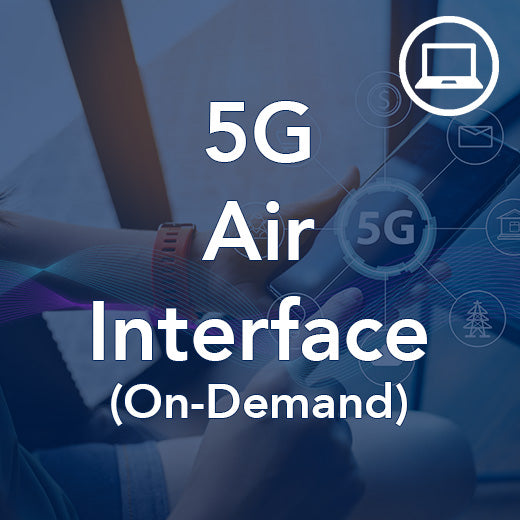
5G Air Interface (On-Demand)
This 5G Air Interface online training course provides a detailed technical description of the air interface for the 5G New Radio. It covers the principles of millimetre wave and multiple antenna communications, the architecture and implementation of the air interface’s physical layer, the higher layer air interface protocols, and the signalling procedures for idle and active 5G devices. This self-paced on-demand distance learning course features illustrated course books, videos, tests and full tutor support. Who would benefit The course is intended for engineers and other staff who are involved with equipment design, operation, optimization or monitoring on the 5G air interface. Prerequisites An engineering background with some knowledge of general radio principles and digital radio systems is assumed. A basic understanding of 5G and experience of LTE radio systems would be desirable. Topic Areas Include: 5G introduction, use cases and standardisation Radio spectrum and millimetre wave communications Principles and implementation of multiple antennas in 5G Architecture of the air interface physical layer Details and implementation of the 5G physical, transport and logical channels Air interface procedures for synchronisation, scheduling, data transmission, feedback and random access Dual connectivity architecture and protocol stacks Also available as a Live Online Training Programme, learn more.
£1,815.00
-
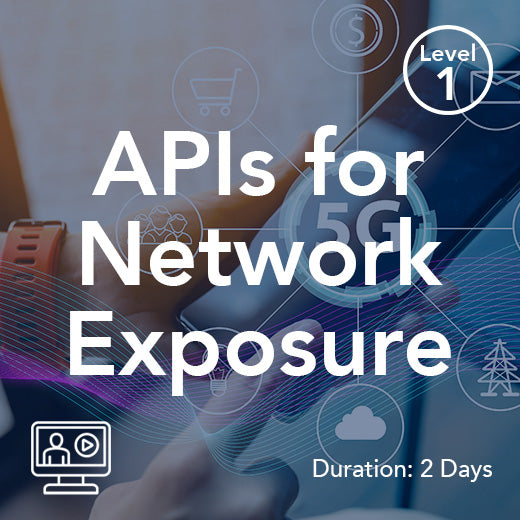
APIs for Network Exposure - From 3GPP Standards to Open Gateway Initiatives
Telecommunication Engineers, API Developers, Project Managers and Enthusiasts in the telecommunications industry who are looking to deepen their understanding of API integration, specifically focusing on NEF (Network Exposure Function) within the context of 3GPP R18 standards and GSMA Open Gateway Initiatives. Prerequisites Basic understanding of telecommunications concepts. Some knowledge or experience of packet-switched data network operation and Internet technology is beneficial. General knowledge about 4G and 5G. Course Contents Introduction to Network Applications API Standards and Definition Protocols for APIs communication and Modelling Languages API Development Tools (Demo) NEF Services APIs NEF Procedures Future trends in API Integration Course Director: Maziar Shoaie Maziar is a seasoned telecommunications trainer with over 23 years of experience. He has delivered courses in more than 45 countries to customers from all over the world, including operators, vendors, and integrators. He is a core-network specialist with expertise in 2G, 3G, 4G, and 5G networks. and the developer of the Wray Castle 5G Lab and Workshop.
£1,815.00
-
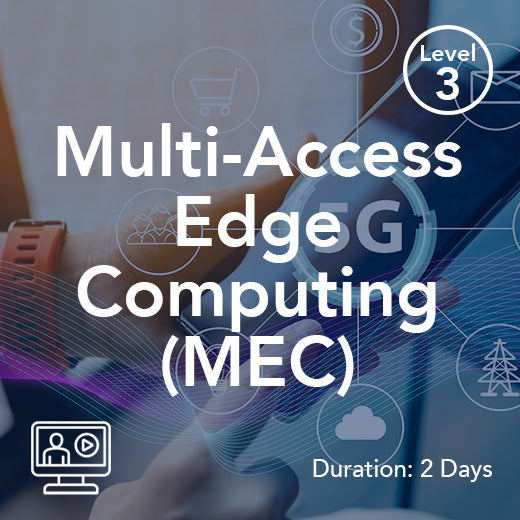
Multi-Access Edge Computing (MEC)
This course explains Multi-Access Edge Computing (MEC) and gives examples of possible MEC use cases. It provides a summary of the technologies used to implement the MEC model, delving into the MEC architecture in depth and discussing MEC's challenges. Use Cases are discussed, as well as an overview of MEC standardisation, specifically the various APIs that support MEC applications. The last section looks at the development of MEC applications and services, specifically how these can be built using collaborative methods and proof of concept studies. Topic Areas Include Introduction Enabling Technologies (Cloud and NFV) Enabling Technologies (4G/5G) MEC Architecture Use Cases MEC standards and APIs Annex A Detailed Use Case Study Speaker: John Timms John Timms is an experienced trainer in IP, VoIP, IPTV, NFV/SDN and IMS/LTE Core. John is also a former Telemanagement Forum Subject Matter Expert and specialist in QoE for VoIP/VoLTE and IP video services.
£1,815.00
-

5G Technologies, Services and Markets (On-Demand)
This 5G Technologies, Services and Markets on-demand course is a non-technical introduction to the 5G mobile communication system, including its capabilities, general structure and operation, as well as its position as a development of previous technologies. The course also covers the place that 5G holds in the telecommunications market, and how that is developing. This self-paced on-demand distance learning course features illustrated course books, videos, tests and full tutor support. Who would benefit This course is intended for non-technical professionals either new to, or already working in, the mobile or fixed telecommunications sector. Prerequisites No technical knowledge is assumed but some familiarity with the telecommunications industry would be beneficial. Topic Areas Include Introduction to 5G Market drivers for 5G Use cases for 5G Performance objectives and spectrum requirements Concepts and key features of 5G Architecture of the core and radio access networks of 5G Voice services in 5G Key industry and market players Standardisation and timelines for 3GPP and the ITU 5G, LTE and Wi-Fi – a holistic approach
£95.00 £47.50
-
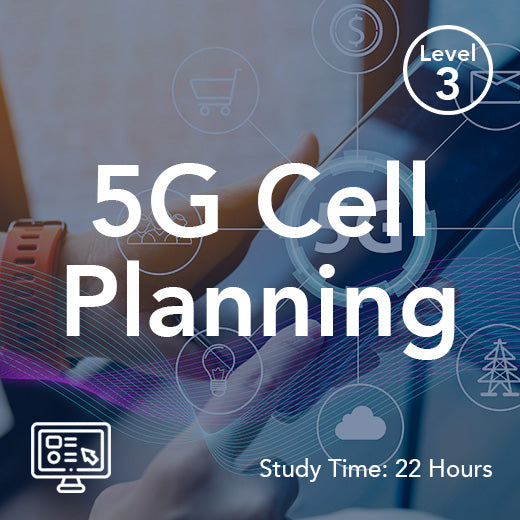
5G Cell Planning (On-Demand)
The heart of any cell planning process begins with coverage and capacity estimations, this course will guide you through the variables that impact both coverage and capacity and provides practical worked examples for a variety of scenarios. As well as the planning process it is also important to understand the RF KPIs and measurements that determine link performance, the essential signals and measurement techniques of the NR are covered in this training as well as a detailed look at parameters that affect the random access process, location management and PCI planning. At the conclusion of this training the student will be well versed in the theory and practice of 5G cell planning with a good understanding of both the principles and application of planning techniques. This self-paced on-demand distance learning course features illustrated course books, videos, tests and full tutor support. Who Would Benefit This course is intended for network planning engineers, who wish to learn about the issues that are involved when planning radio access networks for 5G. Prerequisites The course assumes familiarity with telecommunication systems and with the principles of radio network planning. Some understanding of radio network planning for LTE, and of the 5G air interface, would be beneficial. Topic Areas Include Fundamentals of the 5G Air Interface Link Budget Estimation Coverage Estimation Fundamentals of the 5G Air Interface Link Budget Estimation Coverage Estimation
£750.00
-
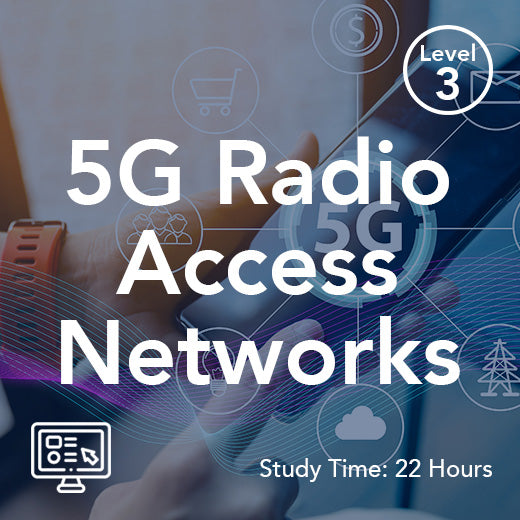
5G Radio Access Network (On-Demand)
The 5G Radio Access Network on-demand course begins by discussing the key features of a 5G network before delving into the finer detail of the 5G New Radio. The 5G RAN is described in terms of network architecture, base station characteristics, spectrum usage and multiple antenna configurations. The transport of signalling and traffic over the 5G RAN interfaces, fronthaul and backhaul are analysed followed by an in depth study of the signalling protocols used over those interfaces. This self-paced on-demand distance learning course features illustrated course books, videos, tests and full tutor support. Who Would Benefit Engineers that need to know about the 5G Radio Access Network in terms of its characteristics, architecture, interfaces and operation Prerequisites Ideally students will have a mobile telecommunications or radio background gained from the study of or working with GSM, UMTS or LTE networks. Topic Areas Include Introduction to 5G 5G RAN NG Interface Messages and Procedures Xn Interface Messages and Procedures E1 Interface Messages and Procedures F1 Interface Messages and Procedures Multi-RAT Dual Cennectivity
£750.00
-
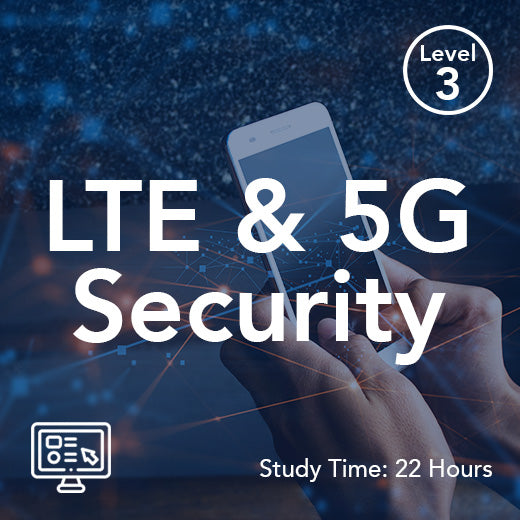
LTE and 5G Security (On-Demand)
LTE and 5G systems are increasingly important in our lives. These systems have the potential to be the basis of much of our future communications and connected devices. LTE and 5G will be used in all kinds of critical applications where we need to have confidence that our data is safe and protected from attack. The concern of mobile security becomes more critical than ever before. Mobile security describes the measures taken to protect against a wide range of threats that seek to violate our privacy and attack the information stored and sent between our phones and connected devices. This course provides a detailed overview of the security environment developed for LTE and 5G networks in both the access and core network domains. This includes LTE Authentication and Key Agreement (AKA), security procedures and Key derivation for LTE Non-Access Stratum, Access Stratum, Access Network and Core Network security. The course then describes the improvements made in 5G security for both Non-standalone and Standalone Modes, 5G security architectures, 5G key derivation and 5G security contexts, 5G procedures for authentication, key agreement, dual connectivity and interworking. Both roaming and non-roaming scenarios are considered. This self-paced on-demand distance learning course features illustrated course books, videos, tests and full tutor support. Who would benefit This course is designed for engineers, managers and other personnel who have a need to acquire a technical overview of the security environment employed within LTE and 5G networks. It will also be of benefit to those in the wider technical community who have a need to understand the security protocols employed by cellular networks. Prerequisites Attendance on, or equivalent knowledge, LTE Engineering or 5G Engineering would be useful. Alternatively, experience working in this area of telecoms. Topic Areas Include LTE Security Architecture Authentication and Key Agreement Evolution to 5G 5G Non-Standalone Mode Security 5G Standalone Mode Security
£750.00
-
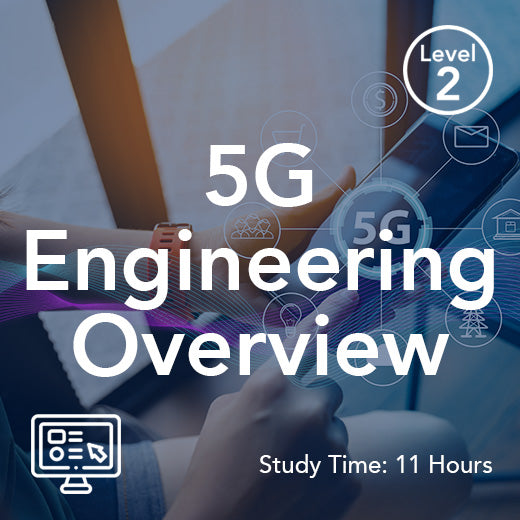
5G Engineering Overview (On-Demand)
This 5G Engineering Overview on-demand course is a technical overview of 5G. The course includes the design goals and development schedule for 5G, and the principles and architecture of the 5G air interface, radio access network and core network. This self-paced on-demand distance learning course features illustrated course books, videos, tests and full tutor support. Who would benefit This course is intended for engineers either new to, or already working in, mobile communications. Prerequisites Familiarity with telecommunications and general engineering terminology is assumed. Some understanding of LTE cellular systems would be beneficial. Topic Areas Include 5G introduction and key features Standardisation and timelines for 3GPP and the ITU Use cases and performance objectives Radio spectrum and millimetre wave communications Principles of radio transmission and reception in 5G Radio access network architecture Non standalone and standalone deployment options Core network architecture Network function virtualisation and network slicing Interworking and compatibility between 5G, LTE and Wi-Fi
£500.00
-
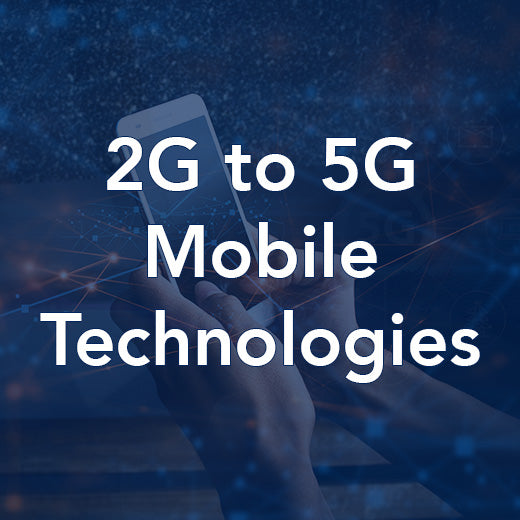
2G to 5G Mobile Technologies
This course provides a comprehensive understanding of Mobile Technologies at a technical overview level, and is ideal as a foundation for a wide range of job functions and roles within telecommunications and adjacent industries.- The programme builds a solid understanding of 2G (GSM), 3G (UMTS), 4G (LTE) and 5G, focusing on the most important aspects of cellular communication technologies and how the principles are applied within each generation. This includes techniques that support basic GSM Voice and SMS, through to the complex set of network and connection requirements needed for advanced 4G and 5G services and use cases. Services, Air Interface, Radio Access Networks, Core Networks, Transmission, Interworking (between generations), and end-to-end connectivity aspects are all considered in order to build a complete picture of modern networks. On completion, participants will be much better placed to significantly contribute across a wide range of projects and business activities within their own organisation. Prerequisites A basic understanding of telecoms principles would be beneficial. Topic Areas Include: An overview of basic radio and cellular techniques and technologies Network Generations from 2G to 5G 3GPP Release programme An overview of 2G (GSM) network architecture and functionality GSM TDMA air interface operating principles GPRS and EDGE upgrades to GSM GSM services TETRA networks An overview of 3G (UMTS) network architecture and functionality UMTS WCDMA air interface operating principles HSPA and HSPA+ upgrades to UMTS An overview of 4G (LTE) network architecture and functionality LTE OFDMA air interface operating principles Evolved Packet Core (EPC) operation Small cells and heterogeneous networks Self Organising Networks (SON) LTE voice options LTE Advanced and LTE Advanced Pro Wi-Fi/Cellular interworking LTE operation in unlicensed frequency bands Machine Type Communications (MTC) LTE for public safety Introduction to 5G 3GPP use cases for 5G Performance targets for 5G Radio Spectrum for 5G 5G OFDMA air interface 5G System Architecture Non Standalone (NSA) and Standalone (SA) New Radio (NR) 5G Core Network Functions Trainer: Les Granfield Les is a technical trainer with 35 years of experience. His expertise extends across a wide range of telecommunications technologies. He specializes in GSM, GSM-R, ERTMS/ETCS, UMTS and LTE radio access networks, radio planning, radio access network optimization and Push to Talk over Cellular (PoC).
£1,815.00
-
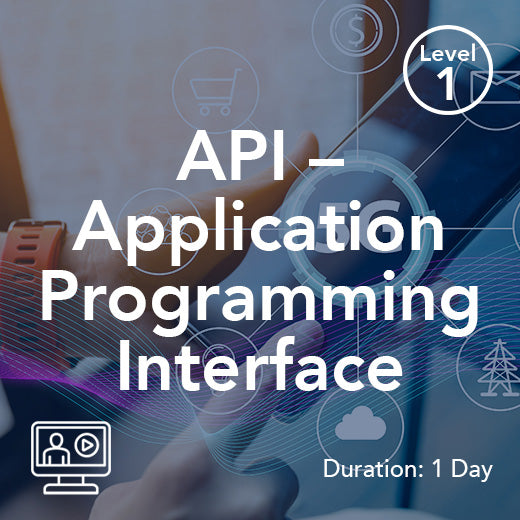
API – Application Programming Interface
Those needing to understand the definition of APIs and its usage in Web Services and 5G Core Network. Prerequisites Some knowledge or experience of packet-switched data network operation and Internet technology is beneficial. General knowledge about 4G and 5G. Course Contents Introduction to API API Standards and Definition API and Web Services 3GPP and 5G APIs 5G Service Based Architecture (SBI) Course Director: Maziar Shoaie Maziar is a seasoned telecommunications trainer with over 23 years of experience. He has delivered courses in more than 45 countries to customers from all over the world, including operators, vendors, and integrators. He is a core-network specialist with expertise in 2G, 3G, 4G, and 5G networks. and the developer of the Wray Castle 5G Lab and Workshop.
£980.00
-
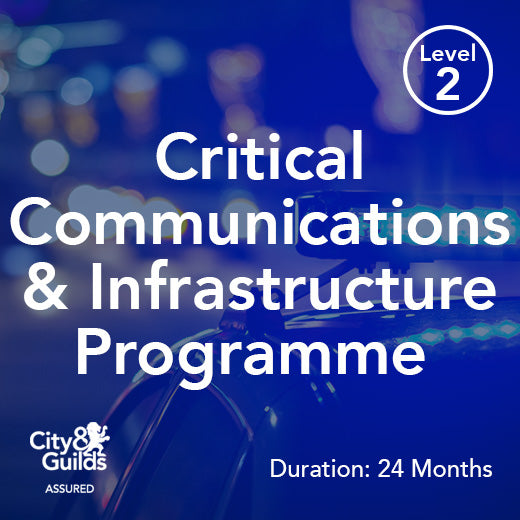
Critical Communications & Infrastructure Programme (Emergency Services Track)
The Critical Communications and Infrastructure Programme (Emergency Services Track) is a comprehensive programme designed to equip professionals in the Emergency Services with the essential knowledge and skills to excel in their roles. The programme aims to provide participants with a holistic understanding of critical communication technologies, strategic insights, and practical skills to navigate the complexities of the ecosystem. This programme has been assured by City & Guilds. Assured status provides validation and recognition for the learner. It is a symbol of learning excellence and quality and is a reassurance that the training undertaken meets best practice standards. Critical Communications & Infrastructure Programme (Emergency Services Track) Syllabus Foundation Courses Technology Fundamentals Course Modules: Defining Telecoms Background to the Telecom Network Digital Fixed Telecom Networks Data Networks Mobile Networks and Wi-Fi Broadband and Emerging Networks 2G to 5G Mobile Technologies Course Modules: Principles of Mobile Cellular Networks 2nd Generation Mobile Networks 3rd Generation Mobile Networks 4th Generation Mobile Networks 5th Generation Mobile Networks Radio Principles Course Modules: A Need for Radio Frequency and Bandwidth Modulation Radio Spectrum Antennas and Transmission Lines Propagation Radio Coverage Radio Interference Analogue and Digital Systems Specialist Courses LTE Mission Critical Communications Course Modules: Requirements of a Mission Critical Network The LTE Radio Interface Multimedia Broadcast Multicast Service The IP Multimedia Subsystem (IMS) Group Communication System Enablers Mission Critical Push to Talk Mission Critical Video Mission Critical Data LTE and LMR Interworking LTE Engineering Course Modules: Introduction to LTE OFDMA Physical Layer Access Stratum Protocols LTE UEs and Access Networks LTE Core Networks LTE Operation LTE Release 9 and Beyond 5G Engineering Course Modules: Introduction to 5G Principles of the 5G New Radio 5G Air Interface 5G Network Architecture 5G Procedures Releases 16 and 17 About City & Guilds City & Guilds is a household brand and a global leader in skills development. Over one million people earn a City & Guilds qualification every year, providing them with the skills they need to thrive in the workplace.In the global economy, the ability to compete depends on building a skilled, competent and confident workforce. City & Guilds understands the value of portable skills and globally recognised standards that enable people and organisations to succeed. It partners with Governments, employers and educators in over 50 countries, across five continents, to advise them on developing high-quality skills training that meets the needs of the global workforce, without compromising on local demands. Enrolment Fees: £2,995 (+VAT) Programme Duration: 24 months (Programme is On-Demand, learners can start at any time) Bespoke In-Company Schemes The Critical Communications and Infrastructure Programme provide the ideal structure for formalising training programmes for teams across your business. Contact us on info@wraycastle.com for more information.
£2,995.00
-
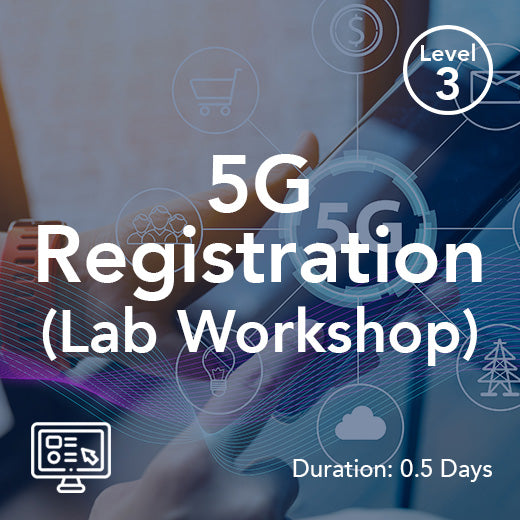
5G Registration (Lab Workshop)
Deep dive into the 5G Registration Message Flow, analyse the output (via Wireshark pcap files) and gain a comprehensive understanding of the 5G registration protocol. The cloud-based lab provides participants with access to a fully emulated 5G System environment. Experiment with the configurations for various Network Functions within the 5G Core Network and build customized settings for signalling scenarios that will enable users to develop greater insight in to the operation of the 5G System. Registration Message Flow Gain a comprehensive understanding of the 5G registration protocols including: Message flows for 5G-AKA Subscriber Data Management PCF Interaction Signalling by NAS, NGAP, and HTTPv2 protocols. Lab Features & Benefits Through a combination of hands-on experience and guided instruction our virtual labs allow users to explore signalling procedures in the 5G system. Our labs feature: A simulated 5G network - Provides hands-on experience and reinforces theoretical knowledge. Guided exercises for signalling scenarios - makes learning and applying new concepts straightforward. Wireshark (pcap) output files – detailed output files provide deep system insight. Cloud-based lab - available 24/7 on any connected device. Individual dedicate server - Ensures that your work is kept private and secure. Ongoing trainer support - ensures you get expert advice when needed. Full integration with Wray Castles training programmes - allows you to build bespoke learning pathways for specialist teams across your organisation. You can find more information on our labs and arranges a demo here.
POA: Closed Course
-
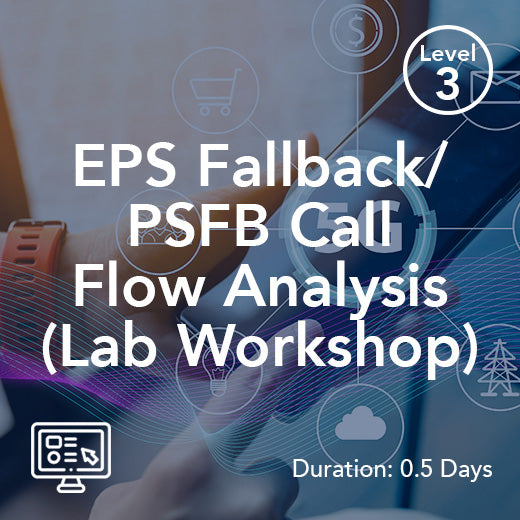
EPS Fallback/PSFB Call Flow Analysis (Lab Workshop)
Deep dive into the EPS Fallback / PSFB Call Flow Analysis and gain a comprehensive understanding sage of the N26 interface for VoNR session handover from 5G to 4G. The cloud-based lab provides participants with access to a fully emulated 5G System environment. Experiment with the configurations for various Network Functions within the 5G Core Network and build customized settings for signalling scenarios that will enable users to develop greater insight in to the operation of the 5G System. EPS Fallback / PSFB Call Flow Analysis Focusing on the usage of the N26 interface for VoNR session handover from 5G to 4G. It provides end-to-end signalling flow and examines protocols such: 4G/5G-NAS, GTP-c, DIAMETER, PFCP & HTTPv2 Lab Features & Benefits Through a combination of hands-on experience and guided instruction our virtual labs allow users to explore signalling procedures in the 5G system. Our labs feature: A simulated 5G network - Provides hands-on experience and reinforces theoretical knowledge. Guided exercises for signalling scenarios - makes learning and applying new concepts straightforward. Wireshark (pcap) output files – detailed output files provide deep system insight. Cloud-based lab - available 24/7 on any connected device. Individual dedicate server - Ensures that your work is kept private and secure. Ongoing trainer support - ensures you get expert advice when needed. Full integration with Wray Castles training programmes - allows you to build bespoke learning pathways for specialist teams across your organisation. You can find more information on our labs and arranges a demo here.
POA: Closed Course
-
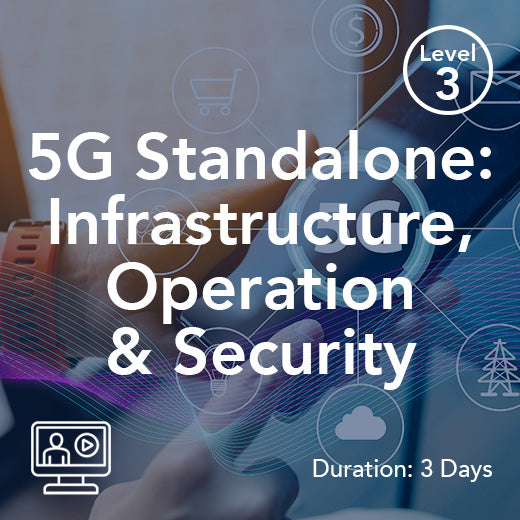
5G Standalone: Infrastructure, Operation & Security
Course Code: FG2301 One of the key requirements of 5G is its flexibility. Spectrum, Radio Interface configurations, RAN (Radio Access Network) deployment, Core Networks, and the mix of 4G and 5G used within the network are highly flexible – with much more flexible resource allocation compared to previous generations.Non-standalone (NSA) 5G made use of this flexibility by enabling 5G to effectively be an add-on to the public 4G LTE network; providing much-needed added capacity in specific locations (many of which were reaching maximum capacity), but continuing to make extensive use of existing 4G infrastructure and operations.As an Industry, we are now looking at full Standalone (SA) 5G – allowing us to gain the full benefits of 5G (in terms of better efficiency, latency, energy use, reliability etc). This means that we will need to transition to specific configurations and deployment options in order to allow full 5G operation. As an example, one of the conditions for SA 5G is that we use the new Service Based Architecture for the 5GC(5G Core).This programme focuses on the 5G system in the form of Standalone 5G (SA 5G), including the various configurations, procedures, and deployment options. Topic Areas Include: Introduction to 5G Principles of the 5G New Radio 5G Air Interface Radio Access Network Architecture Core Network Architecture Data Transport 5G Procedures 5G Security Architecture; and Authentication and Key Agreement Security and the Service Based Interface (including SEPP*) Releases 16 and 17 5G Protocols
£2,660.00
-
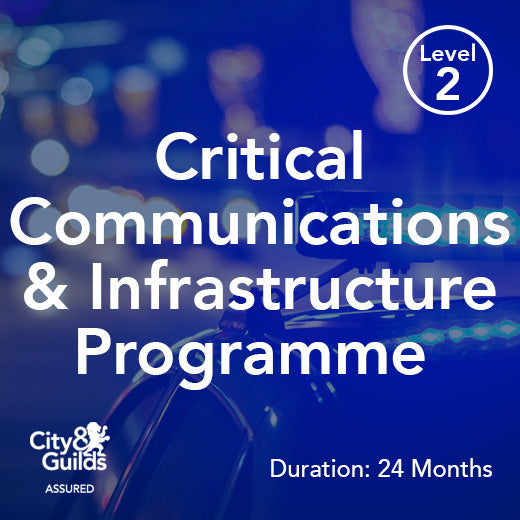
Critical Communications & Infrastructure Programme (Police Track)
Build essential telecoms knowledge and skills to aid forensic investigations and provide expert witness testimony. The widespread use of mobile telephones has proven to be a useful source of information for law enforcement agencies. The ability to prove or disprove that a mobile device was used in the area of, or location of, a point of interest is invaluable. But to safely prove the case requires an understanding of cellular mobile technologies. The Critical Communications & Infrastructure Programme (Police Track) provides those working in Law Enforcement with a detailed understanding of the mobile network technologies of today and tomorrow, allowing them to conduct efficient investigations and provide compelling expert witness evidence in court. We have combined some of our most popular training courses to build a guided learning pathway that enables you to demonstrate your expertise and competence in modern telecom technologies. Who would benefit? Our Critical Communications & Infrastructure Programme (Police Track) has been designed for anyone working Law Enforcement from new starters looking to build their technical knowledge from the ground up to more experienced engineers looking to formalise and expand their knowledge base. Rigorous testing, regular digital badging and certification ensures that successful students are able to demonstrate the breadth and depth of their knowledge. This programme has been assured by City & Guilds. Assured status provides validation and recognition for the learner. It is a symbol of learning excellence and quality and is a reassurance that the training undertaken meets best practice standards. Critical Communications & Infrastructure Programme (Police Track) Syllabus Foundation Courses Technology Fundamentals Course Modules: Defining Telecoms Background to the Telecom Network Digital Fixed Telecom Networks Data Networks Mobile Networks and Wi-Fi Broadband and Emerging Networks 2G to 5G Mobile Technologies Course Modules: Principles of Mobile Cellular Networks 2nd Generation Mobile Networks 3rd Generation Mobile Networks 4th Generation Mobile Networks 5th Generation Mobile Networks Radio Principles Course Modules: A Need for Radio Frequency and Bandwidth Modulation Radio Spectrum Antennas and Transmission Lines Propagation Radio Coverage Radio Interference Analogue and Digital Systems Specialist Courses The TETRA System - An Overview Course Modules: Introduction to TETRA TETRA Services TETRA Network Components TETRA Network Architecture Air Interface Radio Procedures TETRA System Capacity Direct Mode Operation (DMO) Security Aspects of TETRA Radio Network Surveys Course Modules: Cellular Radio Principles GSM/UMTS/LTE/5G Networks Wi-Fi Radio Networks Radio Measurements Idle Mode Activity for Mobile Devices Connected Mode Activities for Mobile Devices Tools for Radio Surveys Guidance for Radio Network Surveys WiFi Engineering Overview Course Modules: Wireless LAN Technologies and Standards 802.11 PHY MAC Frame Structures MAC Procedures Security Wi-Fi Troubleshooting About City & Guilds Assured City & Guilds is a household brand and a global leader in skills development. Over one million people earn a City & Guilds qualification every year, providing them with the skills they need to thrive in the workplace.In the global economy, the ability to compete depends on building a skilled, competent and confident workforce. City & Guilds understands the value of portable skills and globally recognised standards that enable people and organisations to succeed. It partners with Governments, employers and educators in over 50 countries, across five continents, to advise them on developing high-quality skills training that meets the needs of the global workforce, without compromising on local demands. Enrolment Fees: £2,995 (+VAT) Programme Duration: 24 months (Programme is On-Demand, learners can start at any time) Bespoke In-Company Schemes The Critical Communications and Infrastructure Programme provide the ideal structure for formalising training programmes for teams across your business. Contact us on info@wraycastle.com for more information.
£2,995.00
-
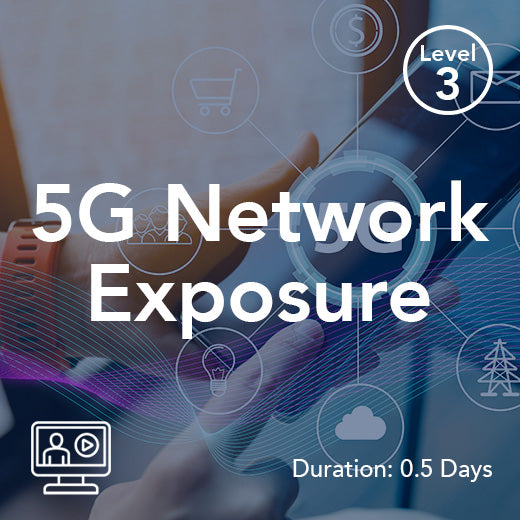
5G Network Exposure
This course is intended for engineers working on the 5G core network, who wish to learn about the exposure of core network capabilities to a third-party application server by way of the NEF. The course introduces the functionality of the NEF up to 3GPP Release 17, and provides an in-depth description of some of its more commonly used services. Prerequisites The course assumes a basic understanding of the architecture and signalling protocols in the 5G core network. Course Contents Network Exposure in 5G Network Exposure Function Services Optional 5G Virtual Lab Module Explore, Test, Optimise, and Troubleshoot the 5G System Deep dive into the key signalling scenarios in the 5G system and analyse the output to build a deeper understanding that goes beyond the theoretical. The lab is a fully emulated 5G System environment that enables you to experiment with the configurations for Network Functions and build customized settings for signalling scenarios that helps you to develop greater insight into the operation of the 5G System. Lab modules can be added to any relevant 5G course. Learn more and arrange a demo.
POA: Closed Course
-
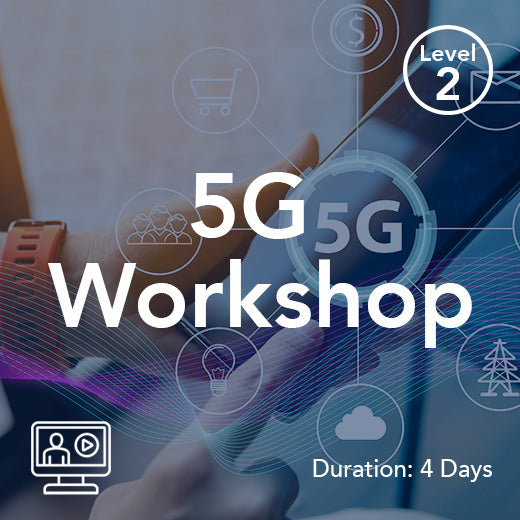
5G Workshop
This intensive 4-day workshop focusses initially on the commercial aspects of 5G and the capabilities it brings to telcos, new and emerging players in the communications industry, as well as adjacent industries. It illustrates how the technology (New Radio, NG-RAN, and SBA – Service Based Architecture), enable and support the required flexibility, cost structures, diverse deployment scenarios, and new use cases – to support existing and new / emerging business models. We explore, and make sense of, the next phase of connectivity and connected innovation, and the role 5G has in enabling the transition to a massively expanded set of business models and opportunities. Participants will build a much clearer picture of the steps they (and their teams) need to take within their own organisation to maximise the opportunities that 5G presents. This workshop then provides a technical introduction to 5G, including the principles, design, and implementation of the 5G air interface, radio access network and core network, and the operation of the 5G system. Prerequisites To gain maximum benefit, participants should have a relatively rounded background in telecommunications or adjacent industries (whether technical, commercial, or both). Course Timetable Day 1 Day 2 Day 3 Day 4 AM The Telecoms Environment 5G as a Key Business Enabler for Ongoing Connectivity Connected Innovation – A New Universe for Connectivity Supporting New Use Cases Principles of the 5G New Radio 5G Network Architecture PM 5G – A Framework for Cost Control 5G Strategy 5G Air Interface 5G Procedures Releases 16 and 17 Optional 5G Virtual Lab Module Explore, Test, Optimise, and Troubleshoot the 5G System Deep dive into the key signalling scenarios in the 5G system and analyse the output to build a deeper understanding that goes beyond the theoretical. The lab is a fully emulated 5G System environment that enables you to experiment with the configurations for Network Functions and build customized settings for signalling scenarios that helps you to develop greater insight into the operation of the 5G System. Lab modules can be added to any relevant 5G course. Learn more and arrange a demo.
POA: Closed Course
-
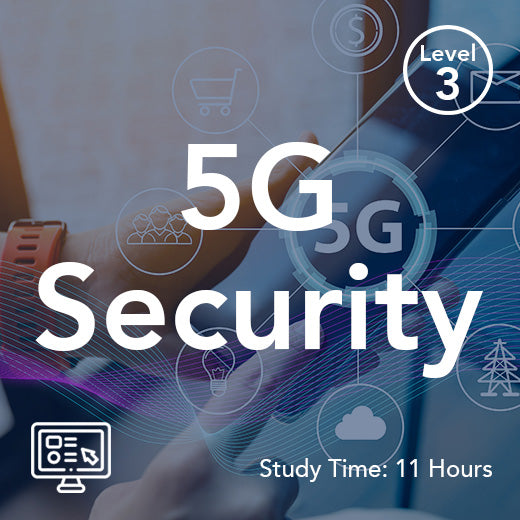
5G Security (On-Demand)
The nature of 5G means that the security architecture and processes need to cover new aspects (when compared to previous 3GPP generations), including 5GNR/LTE Dual Connectivity, standardized interfaces for distributed gNB / RAN architectures, more tightly integrated Non-3GPP Access, and most significantly, the new Service Based Interfaces used within the 5G Core. The 5G Security on-demand course provides a comprehensive grounding in this expanded set of security requirements and mechanisms used in 5G. We start by considering the 5G architecture in order to better understand the overall security requirements for both the UE and network. We then build on the security architecture of 4G LTE, with relevant modifications and additions required for 5G, before focusing squarely on the additional features and procedures required to secure the 5G Core Network (Service Based Interface). This self-paced on-demand distance learning course features illustrated course books, videos, tests and full tutor support. Who would benefit This course is designed for engineers, managers and other personnel who have a need to acquire a technical overview of the security environment employed within 5G networks. It will also be of benefit to those in the wider technical community who have a need to understand the security protocols employed by advanced cellular networks. Prerequisites An understanding of 4G (and legacy 2G and 3G) security procedures would be an advantage as would a basic understanding of 5G and / or LTE network architecture and functionality. Topic Areas Include 5G Architecture and the Service Based Interface 5G Security Architecture and Authentication and Key Agreement Security and the Service Based Interface (including SEPP)
£500.00
-
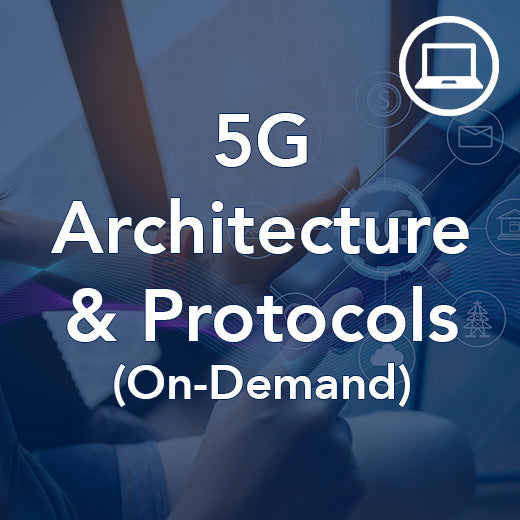
5G Architecture and Protocols (On-Demand)
This 5G Architecture and Protocols on-demand course is a detailed technical description of the core and radio access networks of 5G. It covers the architecture and interfaces used by 5G, the protocols used for signalling and data transport, the provision of services over a 5G network, and the procedures for signalling and system operation. This self-paced on-demand distance learning course features illustrated course books, videos, tests and full tutor support. Who would benefit The course is intended for engineers and other staff who are involved with the architecture, optimization, management, monitoring or testing of the 5G network. Prerequisites An engineering background with some knowledge of core and radio access network technologies is assumed. A basic understanding of 5G and experience of LTE networks would be desirable. Topic Areas Include: 5G introduction, use cases and standardisation Radio access network architecture and deployment options Network architectures for dual connectivity Architecture of the 5G core network Network Function virtualisation, slicing and orchestration Interworking and compatibility between 5G, LTE and Wi-Fi PDU connectivity, Quality of Service and service provision Control plane and user plane protocols in the 5G network Implementation of network function services using HTTP/2 Signalling procedures for registration, security and session management Network operation in Idle, Inactive and Connected modes
£1,815.00
-
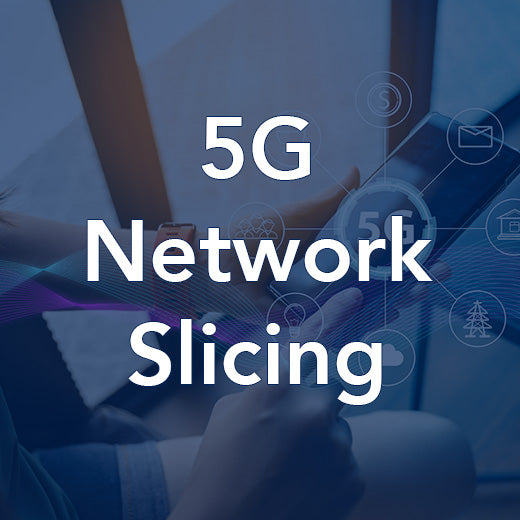
5G Network Slicing
This 5G Network Slicing course examines 5G network slicing and those topics that impact and drive slice strategy. Service and Industry requirements are explored, as well as use case performance objectives. Technical aspects of 5G slice operation are followed by an appraisal of the techniques available to map the requirements onto a practical slice. A generic slice template, and associated attributes, are then used to generate an example slice specification. Finally, practical slice deployment and management options are investigated. Examples are used throughout. Note – Although standard slice identities have been specified, slicing defines a set of techniques that enable operators to differentiate their service offerings. Hence, any “standard” slice templates should be considered as a proprietary solution. This course does NOT attempt to build or provide any such standard slice templates, but will enable participants to better assess slice strategy and evaluate specific solutions. Who would benefit This course is designed for those involved in the design, deployment and commercialisation of 5G. Prerequisites Although we begin with an introduction to 5G and use case requirements, the course focuses on the technical aspects of network slicing, so some experience or knowledge of the 5G system from a technical perspective would be an advantage. Topic Areas Include Introduction to 5G, Use Cases and Connectivity 5G Slicing Slice Development and Deployment Optional 5G Virtual Lab Module Explore, Test, Optimise, and Troubleshoot the 5G System Deep dive into the key signalling scenarios in the 5G system and analyse the output to build a deeper understanding that goes beyond the theoretical. The lab is a fully emulated 5G System environment that enables you to experiment with the configurations for Network Functions and build customized settings for signalling scenarios that helps you to develop greater insight into the operation of the 5G System. Lab modules can be added to any relevant 5G course. Learn more and arrange a demo.
POA: Closed Course
-
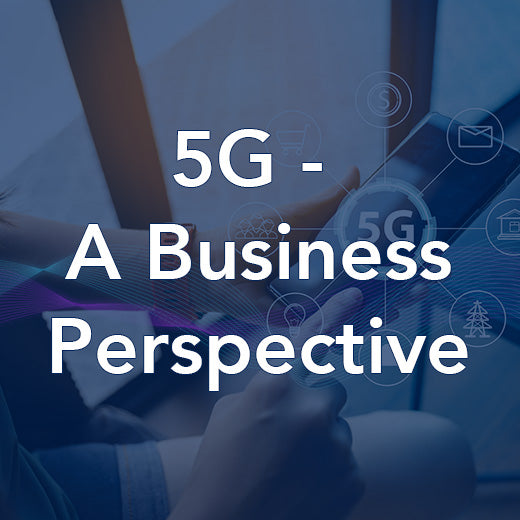
5G - A Business Perspective
The 5G - A Business Perspective training course focusses on the commercial aspects of 5G and the capabilities it brings to telcos, new and emerging players in the communications industry, as well as adjacent industries. It Illustrates how the technology (New Radio, NG-RAN, and SBA – Service Based Architecture), enable and support the required flexibility, cost structures, diverse deployment scenarios, and new use cases – to support existing and new / emerging business models. We explore, and make sense of, the next phase of connectivity and connected innovation, and the role 5G has in enabling the transition to a massively expanded set of business models and opportunities. Participants will build a much clearer picture of the steps they (and their teams) need to take within their own organisation in order to maximise the opportunities that 5G presents. Prerequisites In order to gain maximum benefit, participants should have a relatively rounded background in telecommunications or adjacent industries (whether technical, commercial, or both). Topic Areas Include The Telecoms Environment 5G as a Key Business Enabler for Ongoing Connectivity 5G – A Framework for Cost Control Connected Innovation – A New Universe for Connectivity Supporting New Use Cases 5G Strategy
POA: Closed Course
-
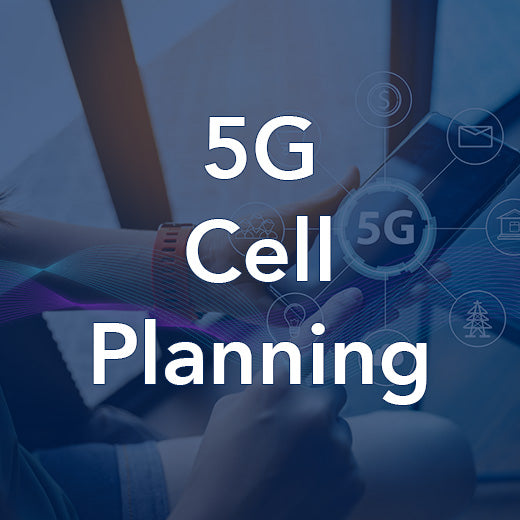
5G Cell Planning
Course Code: FG2002 Course Summary The heart of any cell planning process begins with coverage and capacity estimations, this 5G Cell Planning training course will guide you through the variables that impact both coverage and capacity and provides practical worked examples for a variety of scenarios. As well as the planning process it is also important to understand the RF KPIs and measurements that determine link performance, the essential signals and measurement techniques of the NR are covered in this training as well as a detailed look at parameters that affect the random access process, location management and PCI planning. At the conclusion of this training the student will be well versed in the theory and practice of 5G cell planning with a good understanding of both the principles and application of planning techniques. Who Would Benefit This course is intended for network planning engineers, who wish to learn about the issues that are involved when planning radio access networks for 5G. Prerequisites The course assumes familiarity with telecommunication systems and with the principles of radio network planning. Some understanding of radio network planning for LTE, and of the 5G air interface, would be beneficial. Topic Areas Include Fundamentals of the 5G Air Interface Link Budget Estimation Coverage Estimation Capacity Estimation RSRP, RSRQ and SINR Parameter Setting Also available as a Self-Paced Online Training Programme, learn more.
POA: Closed Course
-
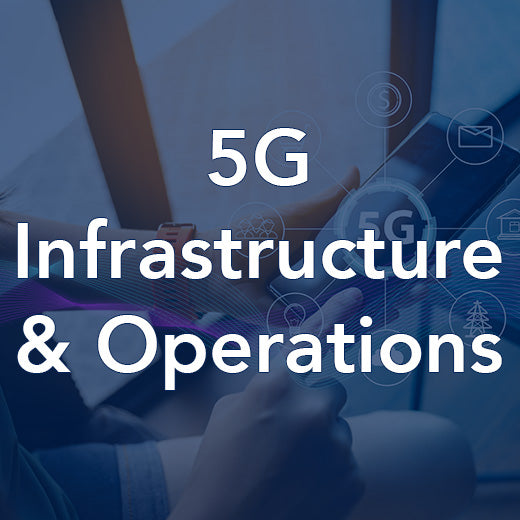
5G Infrastructure and Operation
Course Code: FG1902 Prerequisites This course is intended for engineers either new to, or already working in, mobile communications. Course Contents Introduction to 5G Principles of the 5G New Radio 5G Air Interface Radio Access Network Architecture Core Network Architecture Data Transport 5G Protocols 5G Procedures Releases 16 and 17 Optional 5G Virtual Lab Module Explore, Test, Optimise, and Troubleshoot the 5G System Deep dive into the key signalling scenarios in the 5G system and analyse the output to build a deeper understanding that goes beyond the theoretical. The lab is a fully emulated 5G System environment that enables you to experiment with the configurations for Network Functions and build customized settings for signalling scenarios that helps you to develop greater insight into the operation of the 5G System. Lab modules can be added to any relevant 5G course. Learn more and arrange a demo.
POA: Closed Course
-
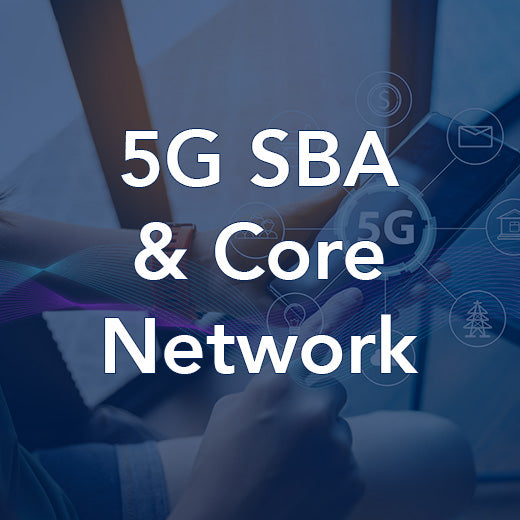
5G Service Based Architecture and Core Network
Core Network Functions are explored, including their overall purpose, their specific role within the SBA, and the features / services that they support. This is followed by a comprehensive survey of the 5G Core and SBA supporting protocols and technologies, as well as a thorough examination of the Service Based Interface (SBI) and Service APIs (Application Programming Interfaces). Example procedures then allow us to build a comprehensive picture of the relevant techniques and features, and to make sense of the way in which the SBA is consistent with, and supports, key 5G enabling principles - including virtualisation and network slicing. Finally, security on the SBI is explored, highlighting the new network functions and techniques that have been introduced with 5G to provide new security features (including the roaming scenario), and a more secure core network domain. Who would benefit This course is designed for those involved in the design, deployment and development of the 5G Service Based Architecture and the 5G Core. Prerequisites This is a technical course, so experience or knowledge of the 5G system from a technical perspective would be an advantage. Topic Areas Include 5G Introduction and Deployment Options The 5G Core Network Functions 5G Core Supporting Protocols and Technologies The Service Based Interface (SBI) and Service APIs Explained Procedures Deployment options SBI Security Optional 5G Virtual Lab Module Explore, Test, Optimise, and Troubleshoot the 5G System Deep dive into the key signalling scenarios in the 5G system and analyse the output to build a deeper understanding that goes beyond the theoretical. The lab is a fully emulated 5G System environment that enables you to experiment with the configurations for Network Functions and build customized settings for signalling scenarios that helps you to develop greater insight into the operation of the 5G System. Lab modules can be added to any relevant 5G course. Learn more and arrange a demo. Also available as a Self-Paced Online Training Programme, learn more.
POA: Closed Course
-
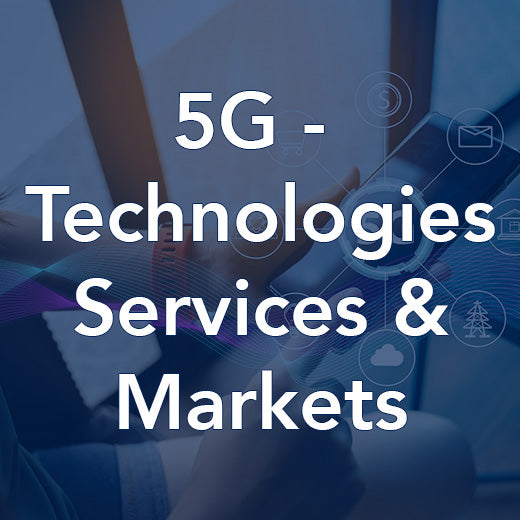
5G Technologies, Services and Markets
Course Code: FG1701 Course Summary This course is a non-technical introduction to the 5G mobile communication system, including its capabilities, general structure and operation, as well as its position as a development of previous technologies. The course also covers the place that 5G holds in the telecommunications market, and how that is developing. Who would benefit This course is intended for non-technical professionals either new to, or already working in, the mobile or fixed telecommunications sector. Prerequisites No technical knowledge is assumed but some familiarity with the telecommunications industry would be beneficial. Topic Areas Include Introduction to 5G Market drivers for 5G Use cases for 5G Performance objectives and spectrum requirements Concepts and key features of 5G Architecture of the core and radio access networks of 5G Voice services in 5G Key industry and market players Standardisation and timelines for 3GPP and the ITU 5G, LTE and Wi-Fi – a holistic approach
POA: Closed Course
-
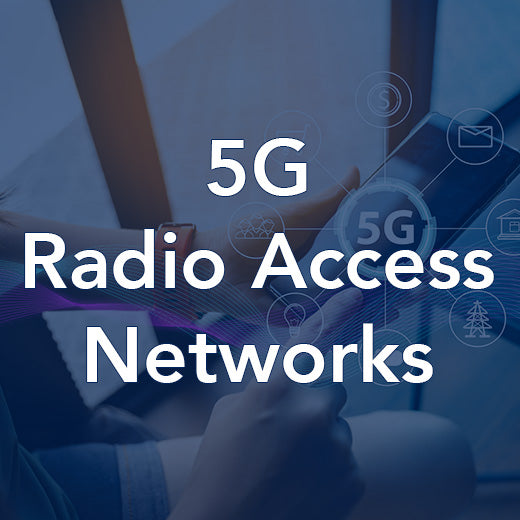
5G Radio Access Network
The 5G Radio Access Network on-demand course begins by discussing the key features of a 5G network before delving into the finer detail of the 5G New Radio. The 5G RAN is described in terms of network architecture, base station characteristics, spectrum usage and multiple antenna configurations. The transport of signalling and traffic over the 5G RAN interfaces, fronthaul and backhaul are analysed followed by an in depth study of the signalling protocols used over those interfaces. Who Would Benefit Engineers that need to know about the 5G Radio Access Network in terms of its characteristics, architecture, interfaces and operation Pre-requisites Ideally attendees will have a mobile telecommunications or radio background gained from the study of or working with GSM, UMTS or LTE networks. Topic Areas Include Introduction to 5G 5G RAN NG Interface Messages and Procedures Xn Interface Messages and Procedures E1 Interface Messages and Procedures F1 Interface Messages and Procedures Multi-RAT Dual Cennectivity Optional 5G Virtual Lab Module Explore, Test, Optimise, and Troubleshoot the 5G System Deep dive into the key signalling scenarios in the 5G system and analyse the output to build a deeper understanding that goes beyond the theoretical. The lab is a fully emulated 5G System environment that enables you to experiment with the configurations for Network Functions and build customized settings for signalling scenarios that helps you to develop greater insight into the operation of the 5G System. Lab modules can be added to any relevant 5G course. Learn more and arrange a demo. Also available as a Self-Paced Online Training Programme, learn more.
POA: Closed Course
-
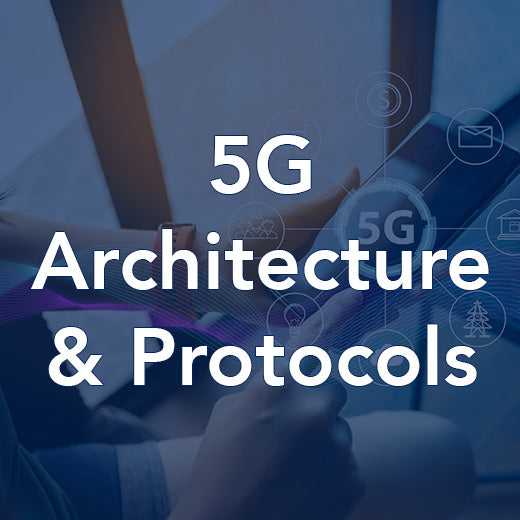
5G Architecture and Protocols
Course Code: FG1715 This 5G Architecture and Protocols training course is a detailed technical description of the core and radio access networks of 5G. It covers the architecture and interfaces used by 5G, the protocols used for signalling and data transport, the provision of services over a 5G network, and the procedures for signalling and system operation. Who would benefit The course is intended for engineers and other staff who are involved with the architecture, optimization, management, monitoring or testing of the 5G network. Prerequisites An engineering background with some knowledge of core and radio access network technologies is assumed. A basic understanding of 5G and experience of LTE networks would be desirable. Topic Areas Include: 5G introduction, use cases and standardisation Radio access network architecture and deployment options Network architectures for dual connectivity Architecture of the 5G core network Network Function virtualisation, slicing and orchestration Interworking and compatibility between 5G, LTE and Wi-Fi PDU connectivity, Quality of Service and service provision Control plane and user plane protocols in the 5G network Implementation of network function services using HTTP/2 Signalling procedures for registration, security and session management Network operation in Idle, Inactive and Connected modes Optional 5G Virtual Lab Module Explore, Test, Optimise, and Troubleshoot the 5G System Deep dive into the key signalling scenarios in the 5G system and analyse the output to build a deeper understanding that goes beyond the theoretical. The lab is a fully emulated 5G System environment that enables you to experiment with the configurations for Network Functions and build customized settings for signalling scenarios that helps you to develop greater insight into the operation of the 5G System. Lab modules can be added to any relevant 5G course. Learn more and arrange a demo. Trainer: Tony Wakefield Tony is an experienced technical trainer and competency development specialist having worked with a diverse and extensive base of companies. He has spoken at global conferences and has extensive experience in facilitating programmes, specialising in 5G and the wider aspects of telecoms and connected innovation. Also available as a Self-Study Online Learning Programme, learn more.
POA: Closed Course
-
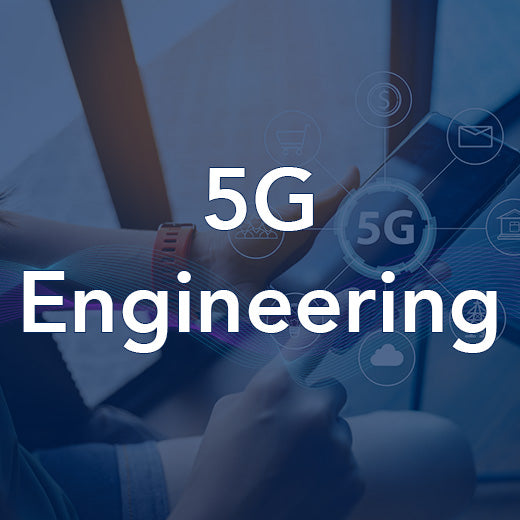
5G Engineering Overview
This 5G Engineering Overview course is a technical overview of 5G. The course includes the design goals and development schedule for 5G, and the principles and architecture of the 5G air interface, radio access network and core network. Who would benefit This course is intended for engineers either new to, or already working in, mobile communications. Prerequisites Familiarity with telecommunications and general engineering terminology is assumed. Some understanding of LTE cellular systems would be beneficial. Topic Areas Include 5G introduction and key features Standardisation and timelines for 3GPP and the ITU Use cases and performance objectives Radio spectrum and millimetre wave communications Principles of radio transmission and reception in 5G Radio access network architecture Non standalone and standalone deployment options Core network architecture Network function virtualisation and network slicing Interworking and compatibility between 5G, LTE and Wi-Fi
POA: Closed Course
-
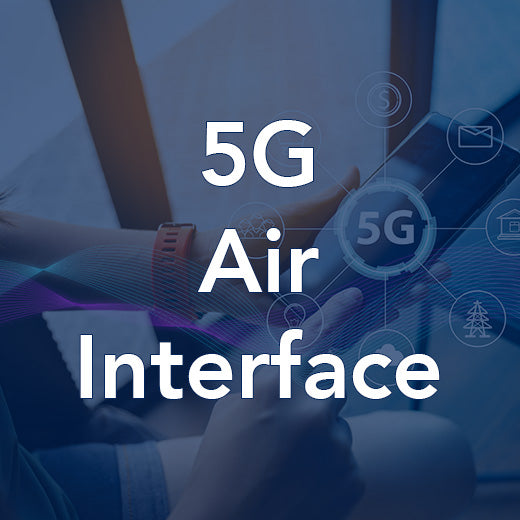
5G Air Interface
This 5G Air Interface training course is a detailed technical description of the air interface for the 5G New Radio (5G NR). It covers the principles of millimetre wave and multiple antenna communications, the architecture and implementation of the air interface’s physical layer, the higher layer air interface protocols, and the signalling procedures for idle and active 5G devices. Who would benefit The course is intended for engineers and other staff who are involved with equipment design, operation, optimization or monitoring on the 5G air interface. Prerequisites An engineering background with some knowledge of general radio principles and digital radio systems is assumed. A basic understanding of 5G and experience of LTE radio systems would be desirable. Topic Areas Include: 5G introduction, use cases and standardisation Radio spectrum and millimetre wave communications Principles and implementation of multiple antennas in 5G Architecture of the air interface physical layer Details and implementation of the 5G physical, transport and logical channels Air interface procedures for synchronisation, scheduling, data transmission, feedback and random access Dual connectivity architecture and protocol stacks Optional 5G Virtual Lab Module Explore, Test, Optimise, and Troubleshoot the 5G System Deep dive into the key signalling scenarios in the 5G system and analyse the output to build a deeper understanding that goes beyond the theoretical. The lab is a fully emulated 5G System environment that enables you to experiment with the configurations for Network Functions and build customized settings for signalling scenarios that helps you to develop greater insight into the operation of the 5G System. Lab modules can be added to any relevant 5G course. Learn more and arrange a demo. Also available as a Self-Study Online learning programme, learn more.
POA: Closed Course



















































